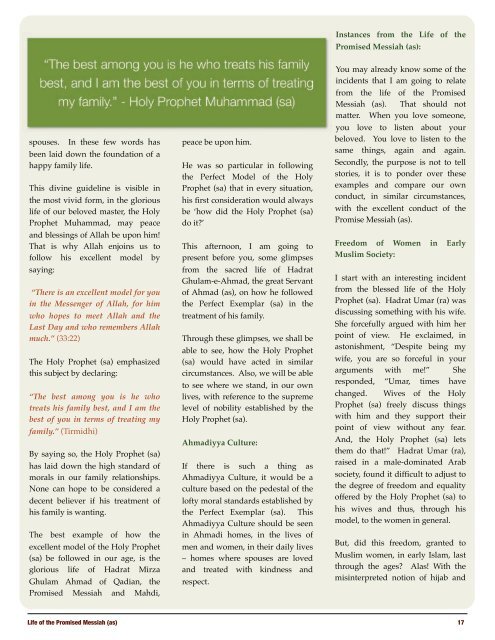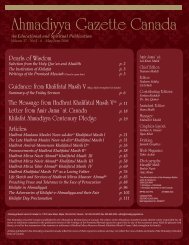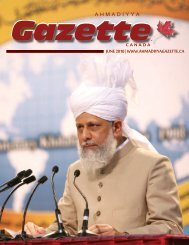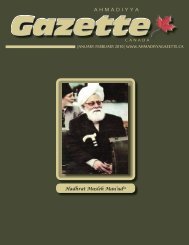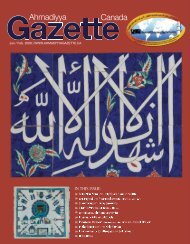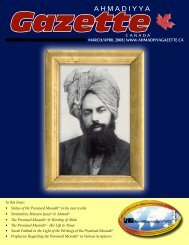Ahmadiyya Gazette Canada
Ahmadiyya Gazette Canada
Ahmadiyya Gazette Canada
You also want an ePaper? Increase the reach of your titles
YUMPU automatically turns print PDFs into web optimized ePapers that Google loves.
Instances from the Life of the<br />
Promised Messiah (as):<br />
spouses. In these few words has<br />
been laid down the foundation of a<br />
happy family life.<br />
This divine guideline is visible in<br />
the most vivid form, in the glorious<br />
life of our beloved master, the Holy<br />
Prophet Muhammad, may peace<br />
and blessings of Allah be upon him!<br />
That is why Allah enjoins us to<br />
follow his excellent model by<br />
saying:<br />
“There is an excellent model for you<br />
in the Messenger of Allah, for him<br />
who hopes to meet Allah and the<br />
Last Day and who remembers Allah<br />
much.” (33:22)<br />
The Holy Prophet (sa) emphasized<br />
this subject by declaring:<br />
“The best among you is he who<br />
treats his family best, and I am the<br />
best of you in terms of treating my<br />
family.” (Tirmidhi)<br />
By saying so, the Holy Prophet (sa)<br />
has laid down the high standard of<br />
morals in our family relationships.<br />
None can hope to be considered a<br />
decent believer if his treatment of<br />
his family is wanting.<br />
The best example of how the<br />
excellent model of the Holy Prophet<br />
(sa) be followed in our age, is the<br />
glorious life of Hadrat Mirza<br />
Ghulam Ahmad of Qadian, the<br />
Promised Messiah and Mahdi,<br />
peace be upon him.<br />
He was so particular in following<br />
the Perfect Model of the Holy<br />
Prophet (sa) that in every situation,<br />
his first consideration would always<br />
be ‘how did the Holy Prophet (sa)<br />
do it?’<br />
This afternoon, I am going to<br />
present before you, some glimpses<br />
from the sacred life of Hadrat<br />
Ghulam-e-Ahmad, the great Servant<br />
of Ahmad (as), on how he followed<br />
the Perfect Exemplar (sa) in the<br />
treatment of his family.<br />
Through these glimpses, we shall be<br />
able to see, how the Holy Prophet<br />
(sa) would have acted in similar<br />
circumstances. Also, we will be able<br />
to see where we stand, in our own<br />
lives, with reference to the supreme<br />
level of nobility established by the<br />
Holy Prophet (sa).<br />
<strong>Ahmadiyya</strong> Culture:<br />
If there is such a thing as<br />
<strong>Ahmadiyya</strong> Culture, it would be a<br />
culture based on the pedestal of the<br />
lofty moral standards established by<br />
the Perfect Exemplar (sa). This<br />
<strong>Ahmadiyya</strong> Culture should be seen<br />
in Ahmadi homes, in the lives of<br />
men and women, in their daily lives<br />
– homes where spouses are loved<br />
and treated with kindness and<br />
respect.<br />
You may already know some of the<br />
incidents that I am going to relate<br />
from the life of the Promised<br />
Messiah (as). That should not<br />
matter. When you love someone,<br />
you love to listen about your<br />
beloved. You love to listen to the<br />
same things, again and again.<br />
Secondly, the purpose is not to tell<br />
stories, it is to ponder over these<br />
examples and compare our own<br />
conduct, in similar circumstances,<br />
with the excellent conduct of the<br />
Promise Messiah (as).<br />
Freedom of Women in Early<br />
Muslim Society:<br />
I start with an interesting incident<br />
from the blessed life of the Holy<br />
Prophet (sa). Hadrat Umar (ra) was<br />
discussing something with his wife.<br />
She forcefully argued with him her<br />
point of view. He exclaimed, in<br />
astonishment, “Despite being my<br />
wife, you are so forceful in your<br />
arguments with me!” She<br />
responded, “Umar, times have<br />
changed. Wives of the Holy<br />
Prophet (sa) freely discuss things<br />
with him and they support their<br />
point of view without any fear.<br />
And, the Holy Prophet (sa) lets<br />
them do that!” Hadrat Umar (ra),<br />
raised in a male-dominated Arab<br />
society, found it difficult to adjust to<br />
the degree of freedom and equality<br />
offered by the Holy Prophet (sa) to<br />
his wives and thus, through his<br />
model, to the women in general.<br />
But, did this freedom, granted to<br />
Muslim women, in early Islam, last<br />
through the ages? Alas! With the<br />
misinterpreted notion of hijab and<br />
Life of the Promised Messiah (as) 17


